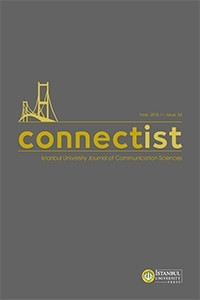THE JYLLANDS-POSTEN PROPHET MUHAMMAD CARTOONS CONTROVERSY: FREEDOM OF EXPRESSION OR CLASHING OF STEREOTYPES?
Danimarka'nın Jyllands-Posten Gazetesi'nin Hz. Muhammed Karikatürleri Tartışması, pek çoğu hiç de hoş olmayan ve İslam Peygamberi Hz. Muhammed'i tasvir eden 12 karikatürün söz konusu gazetede yayımlanması ile başladı. Bununla beraber gazete, Hz. Muhammed karikatürlerini yayımlayarak İslam'ı eleştirme konusunda otosansür ve ifade özgürlüğü veya basın özgürlüğü adına yeni bir tartışma başlattıklarını iddia etti. Bu bakımdan Jyllands-Posten Gazetesi İslam Peygamberi'ni bir kez daha terörizm ile yan yana getirerek ‘ötekiler'e karşı bir kez daha önyargıya neden oldu. Bu makalede, medya ürünlerindeki ırkçı stereotiplerin ideolojik önyargıları, Jyllands-Posten'ın Hz. Muhammed Karikatürleri'nin göstergebilimsel ve izleyici analiziyle incelenmiştir. İzleyiciyi araştırma yöntemi olarak derinlemesine mülakat yöntemi kullanılmıştır. Mülakatlar, izleyicilerin karikatürlere reaksiyonlarını tanımlamak üzere Amerikalı, Avrupalı, Afrikalı ve Asyalı olmak üzere toplam 20 katılımcıyla yazar tarafından Mayıs, Haziran ve Temmuz 2006'da Mersin ve Adana'da gerçekleştirilmiştir .Mülakatlara katılanların büyük bir kısmı Hz. Muhammed karikatürlerindeki ırkçı ve dini stereotiplerin saldırgan ve zararlı olduğunu açıklamıştır. Katılımcıların pek çoğu Hz. Muhammed'i terörist olarak tasvir eden karikatürlerin yayımlanmasının ifade özgürlüğü veya basın özgürlüğü ile açıklanamayacağına işaret ederek söz konusu durumun insan haklarına saldırı olduğunu belirtmiştir. Çalışmamız kapı tutucuların, haber toplama ve bildirme özgürlüğünün ırklar, cinsiyetler, gruplar, toplumlar, dinler ve daha pek çok alanda önyargılara neden olabileceğini onaylamaları gerektiğini önermektedir. Anahtar Kelimeler: İfade özgürlüğü, stereotipler, Jyllands-Posten. Abstract: The Jyllands-Posten Prophet Muhammad Cartoons Controversy: Freedom Of Expression Or Clashing Of Stereotypes? The Jyllands-Posten Prophet Muhammad Cartoons controversy began after twelve editorial cartoons, most of which distastefully depicted the Islamic Prophet Muhammad, were published in the Danish newspaper Jyllands-Posten on September 30, 2005. Although the newspaper claimed that, by publishing the Prophet Muhammad cartoons, they contributed to debate about self-censoring themselves from criticizing Islam, and to the freedom of speech or to the freedom of the press. In this respect, the newspaper caused a prejudice against ‘others' by once again associating the Prophet with terrorism. In this article, the ideological prejudices of racial stereotypes in media outlets was examined through a semiotic analysis and audience analysis of The Jyllands-Posten prophet Muhammad cartoons. In-depth interviewing was used as a method of making research among the audience. These interviews were conducted by the author with totally 20 American, European, African and Asian respondents to identify the reaction of the audiences to the cartoons on May, June and July 2006 in Mersin and Adana. Majority of respondents of in-depth interviews stated that racial and religious stereotyping in the Prophet Muhammad Cartoons is offensive and harmful. Most of the respondents, at the same time, pointed out that publishing these cartoons can not be explained by the freedom of expression or freedom of the press and portraying a prophet as a terrorist can explicitly be regarded as an attack against human rights. Our study suggests that gate keepers should recognize that freedom of gathering and reporting information may cause prejudices against races, gender, groups, societies and religions. Keywords: Freedom of speech, stereotypes, The Jyllands-Posten.
